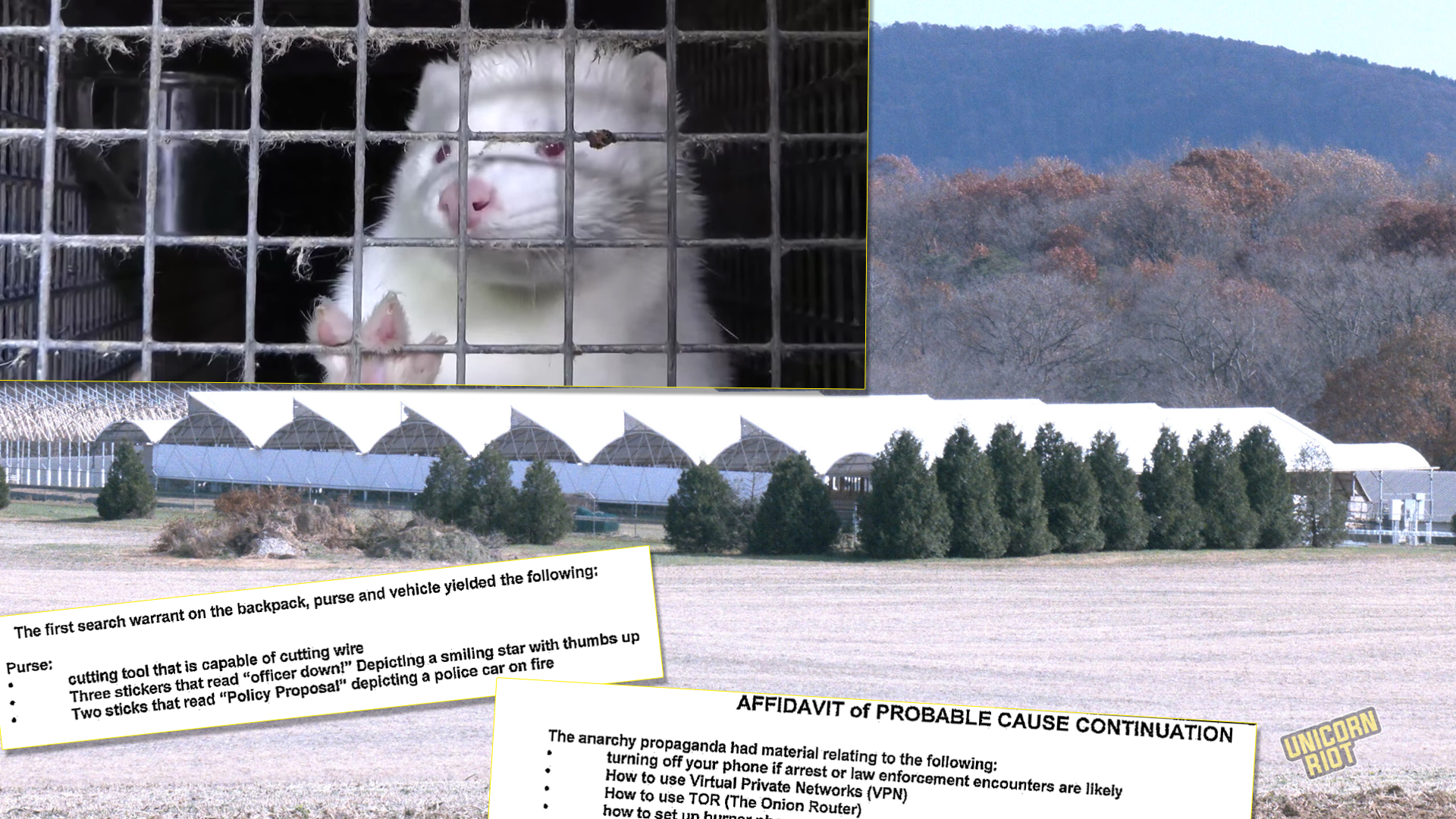‘Northumberland 2’ Free on Bail After Alleged Mink Release in PA Felony Case
Northumberland County, PA — Two women from Massachusetts were freed on bail from jail last week after the alleged October 19 release of over 600 mink from the Richard H. Stahl Sons Inc. fur farm near Sunbury, off Pennsylvania State Route 890. State prosecutors charged Celeste Legere and Cara Mitrano with over a dozen criminal counts — including ecoterrorism and RICO charges — and they face decades in prison.
Originally held on $150,000 bail each, Legere and Mitrano were later allowed by a judge to post 10 percent of the full bail amount.
Legere and Mitrano face identical sets of charges in Pennsylvania state court. In addition to the RICO and ecoterrorism charges, they are also charged with Agricultural Vandalism, Criminal Mischief, Theft, Burglary, Loitering and Prowling at Nighttime, Accidents Involving Damage to Attended Vehicle or Property, Recklessly Endangering Another Person, Cruelty to Animals, Agricultural Trespassing on Posted Land, and Depositing Waste on a Highway — as well as Conspiracy counts related to the Ecoterrorism, Agricultural Vandalism and Burglary charges. (An additional charge of “Conspire in Unwarranted Detention” was withdrawn earlier.)
Pennsylvania’s Ecoterrorism statute became law in 2006, shortly before a similar federal law — the Animal Enterprise Terrorism Act — was signed by then-President George W. Bush. Before the PA statute went into effect, the ACLU said that it “violates the First Amendment because it discriminates against certain expressive speech based on the viewpoint of the speaker” and warned that “people who engage in traditional forms of civil disobedience, such as sit-ins, could be treated as terrorists.”
Both the state and federal laws widened the scope of what counts as “terrorism” — a word usually reserved for killing or threatening to kill civilians in order to influence government policy — to include acts intended to “prevent or obstruct” businesses in the agricultural or animal industries.
These laws were part of the post-9/11 “Green Scare” era during which the Earth Liberation Front and Animal Liberation Front were the U.S. government’s top domestic “terror” targets. Industry groups and politicians successfully exploited the political climate after the September 11, 2001 attacks to criminalize direct action movements targeting companies for their harmful and controversial practices — often garnering popular support as animal rights abuses and environmental damages became more widely known.
Chris Carraway, staff attorney at the Animal Activist Legal Defense Project, told Unicorn Riot that the case against Legere and Mitrano is “part of a decades-long effort to vilify and persecute animal rights activists.”
“Here, the addition of animal cruelty charges adds insult to injury. A society that protects an industry that gasses and electrocutes animals to turn them into coats, while charging those who allegedly attempt to free those animals with terrorism and cruelty, has utterly lost its moral compass. The true ecoterrorism on this planet comes from corporate industries that destroy habitats, pollute the environment, and slaughter billions of animals for profit.”
Chris Carraway, Staff Attorney, Animal Activist Legal Defense Project
Pennsylvania State Police Complaint Outlines Alleged Mink Release
Celeste Legere and Cara Mitrano were both arrested in the early hours of October 19 after the Stahl fur farm’s security system went off and surveillance cameras showed two individuals releasing minks from pens and destroying breeding records, according to a Pennsylvania State Police (PSP) complaint.
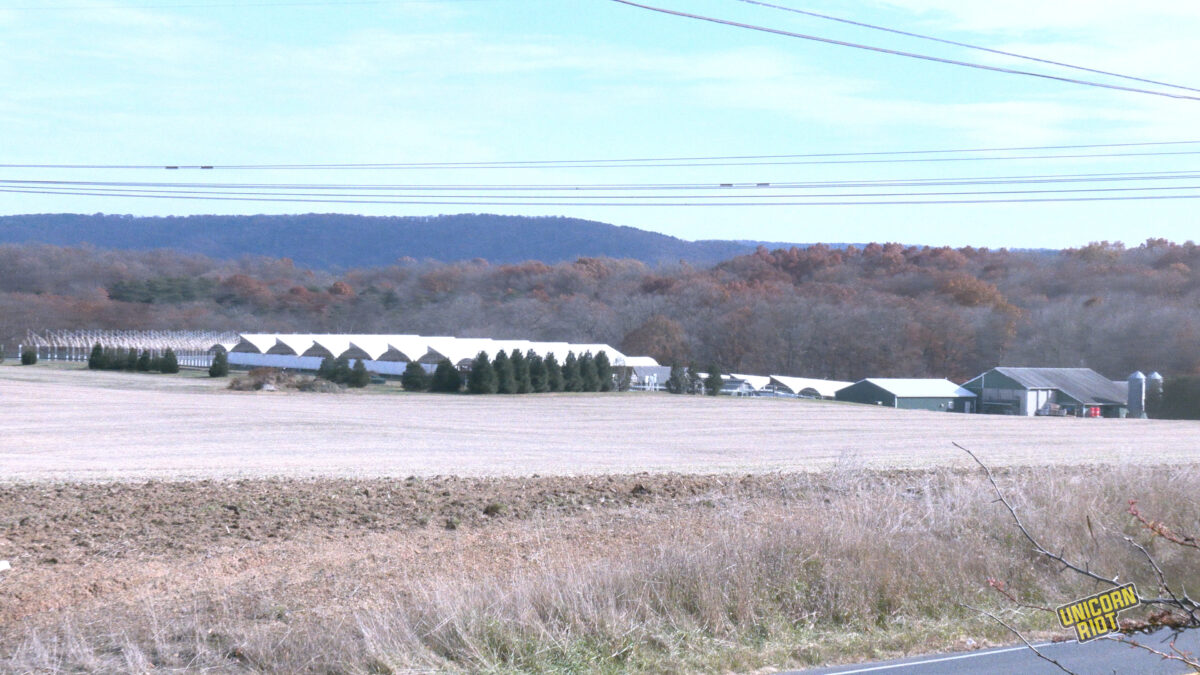
Much of the PSP probable cause affidavits rely on the narrative provided by members of the Stahl family who own and operate the fur farm — Mark, April and John Stahl.
According to the affidavits, Mark Stahl told state troopers that his “camera sensors were activated” and captured two individuals — alleged to be Legere and Mitrano — “inside the enclosed property…wearing dark clothing with head lamps…carrying bags…[with] their hoods up.” They then released 683 mink “and destroyed records on the pens,“ according to an affidavit.
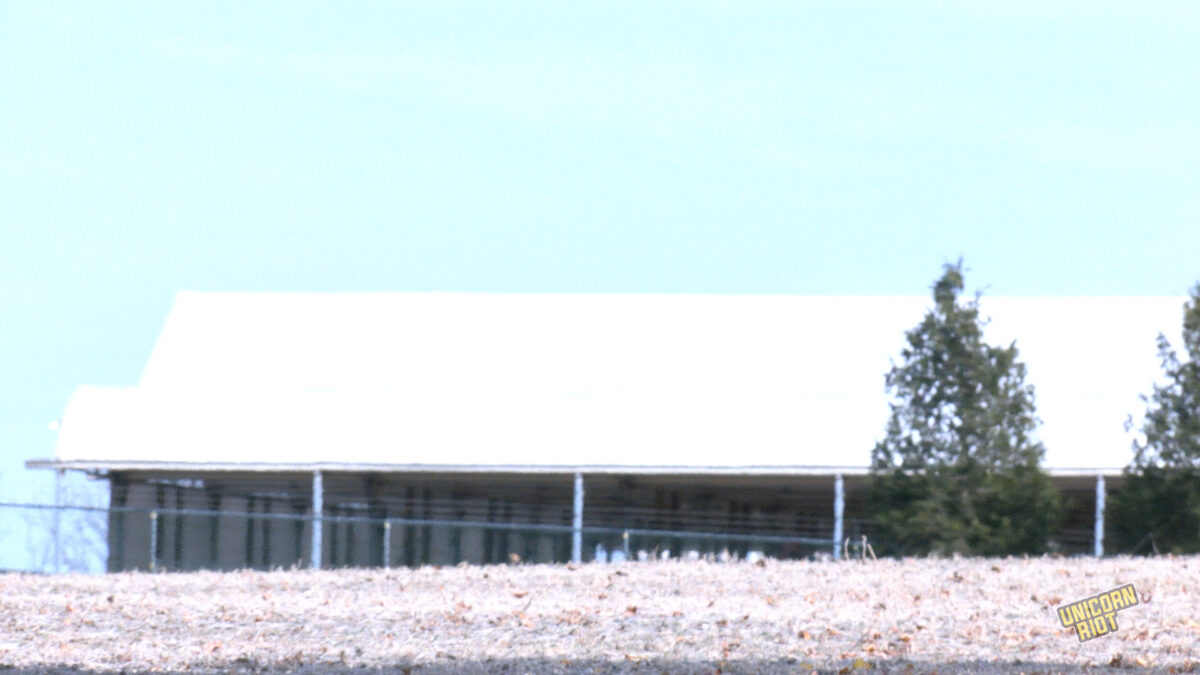
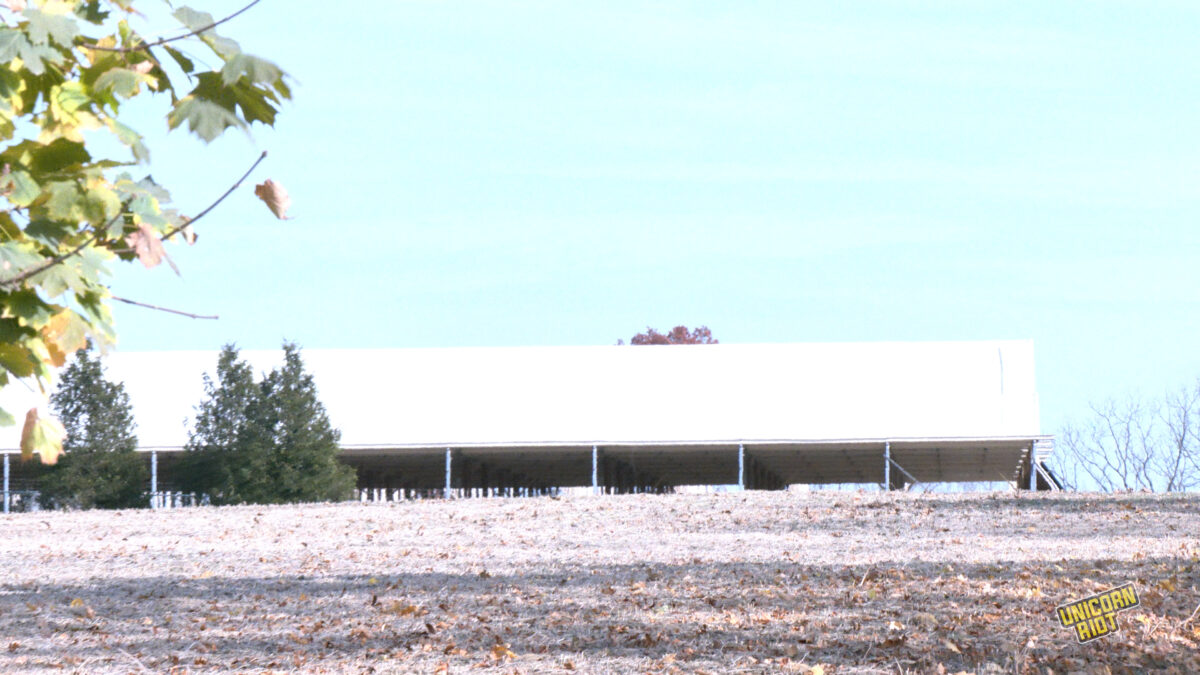
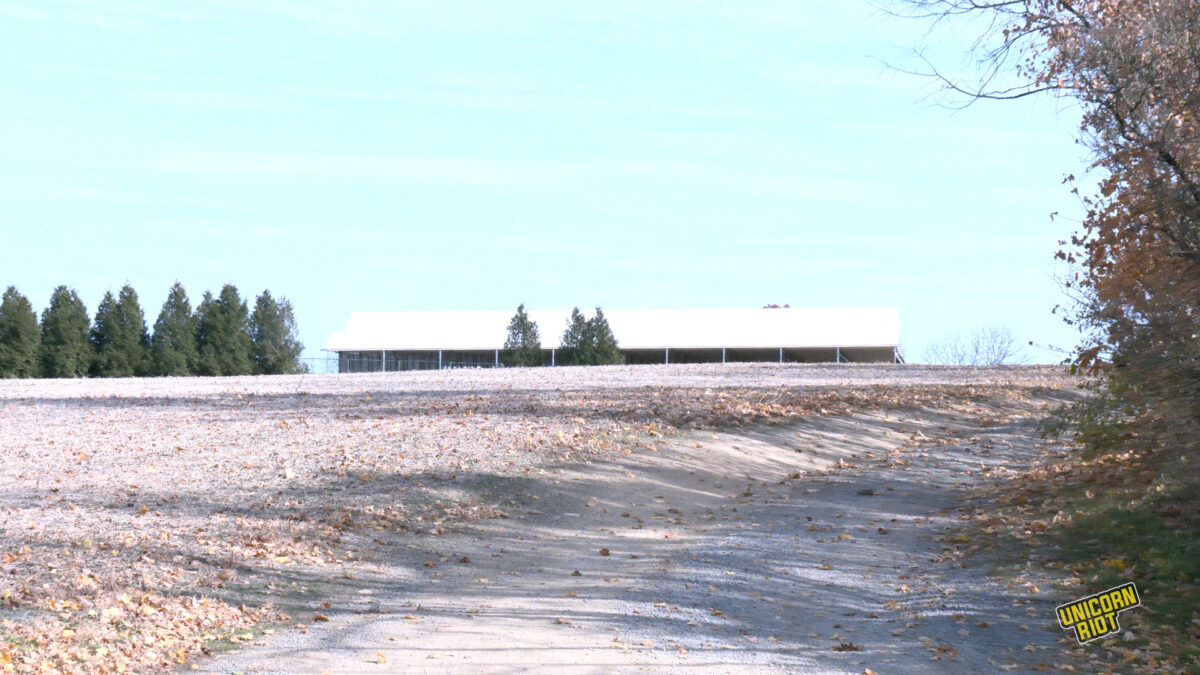
April Stahl claims to have photographed a vehicle fleeing the fur farm shortly thereafter. (The prosecution asserts this is the same car Legere and Mitrano were later pulled over in when they were arrested.) April Stahl and John Stahl then turned their own car sideways on a road, blocking it, at which point the vehicle leaving the scene is alleged to have struck the Stahls’ car on its way out; April and John Stahl then reportedly followed the fleeing vehicle. (The exact location alleged in the documents is not clear.)
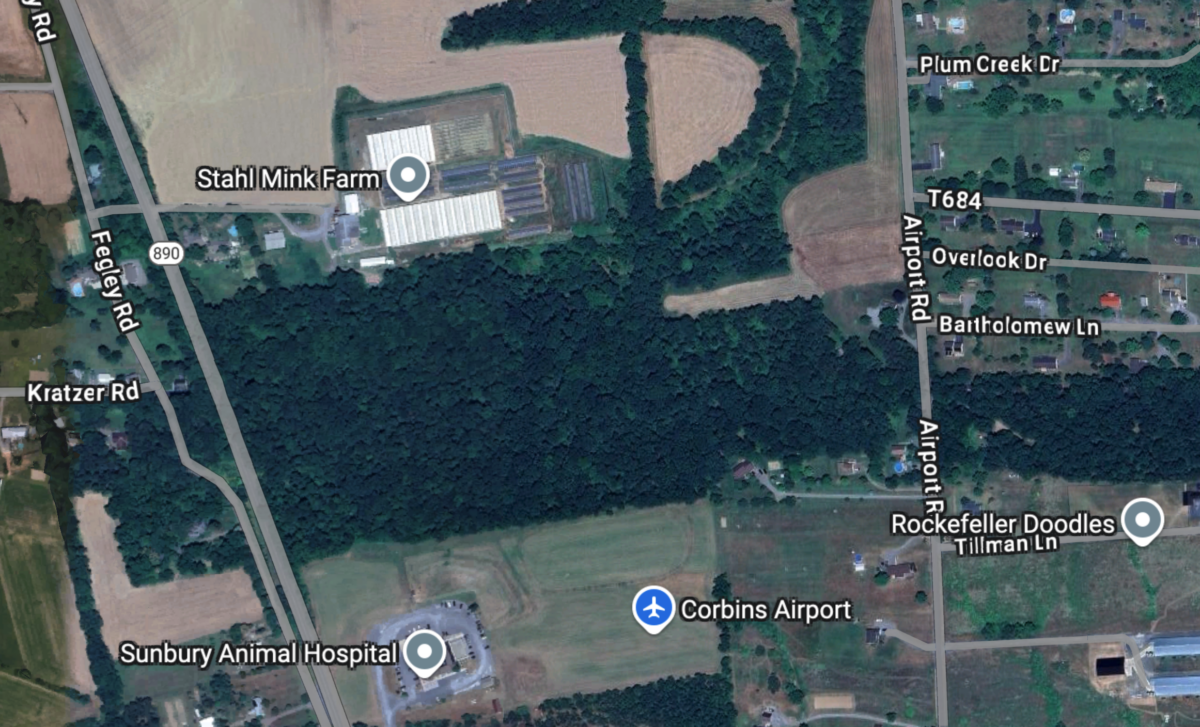
Before losing sight of the fleeing car, April and John Stahl told police that they “observed a backpack, work glove and dark in color sweatshirt get tossed out the suspect vehicles driver and passenger windows.” The items were reportedly recovered later by Pennsylvania State Troopers.
At around 1:14 AM, Legere and Mitrano were pulled over by Ralpho Township Police Officer Glen Wonsock, who arrested them before handing them over to Pennsylvania state troopers Cody Fischer and Jacob Hook – the authors of the affidavits.
Fischer and Hook wrote in an affidavit that they then obtained search warrants for the defendants’ vehicle as well as a backpack and purse found inside it. The troopers claimed to find items including a “pair of work gloves,” a “lock picking kit,” “two headlamps” and “two orange plastic crowbars.”
However, the Affidavit of Probable Cause also includes items of a political nature within the basis for the criminal case – dovetailing with efforts across the country to criminalize anarchist, antifascist and environmental and animal rights movements.
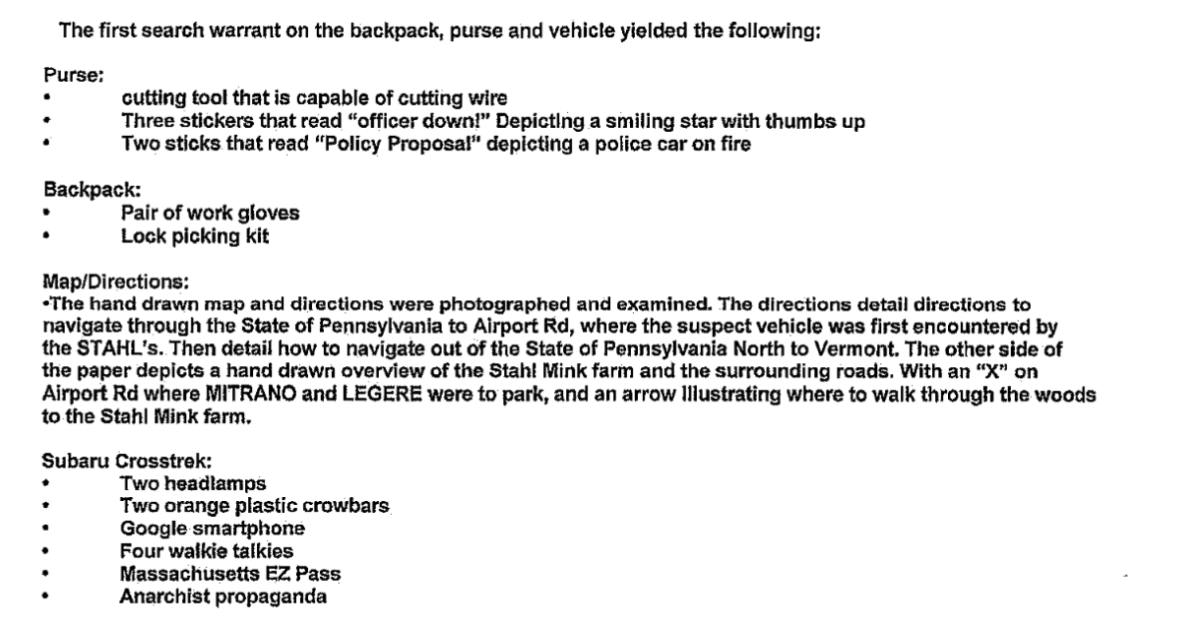
Items listed by police include “Three stickers that read ‘Officer down!'” depicting a smiling star with thumbs up” as well as “Two stick[ers] that read ‘Policy Proposal‘ depicting a police car on fire”, “Anarchist propaganda” and literature about how to use a Virtual Private Network (VPN) and the Tor browser to privately browse the internet.

Political surveillance and profiling of U.S. citizens by the federal government based on their perceived ideology is also directly involved in the case beyond the purely physical mechanics of an alleged criminal act.
The affidavit signed by Troopers Fischer and Hook indicates that the defendants and their roommates have been monitored by federal authorities prior to being accused of anything in court: “Following the search I made contact with FBI Intelligence. The FBI Source informed my that both Mitrano and Legere are connected with two anarchist Communes in… Massachusetts.”
Affidavit Conflates Post-Arrest Bail Arrangements with A Priori Payment for Crimes
Troopers Fischer and Hook’s signed and sworn probable cause statements, approved by Magisterial District Judge Rachel Wiest-Benner, appear to misrepresent one of the defendant’s attempts to raise bail money, purporting a notion that they were expecting to be paid for raiding the fur farm. (Wiest-Benner won an open judicial seat late in 2023.)

Fischer and Hook’s affidavit notes a recorded jail call by Celeste Legere was discussing their bail being set at $150,000, but claims that Legere saying on the call that she was “already promised $50,000…. illustrates Legere was promised $50,000 dollars prior to coming to Pennsylvania and committing the above crimes.” This seems to extend a national trend of attempting to criminalize raising bail funds for arrested protesters — in Atlanta, a similar line of attack led to money laundering charges against a bail fund supporting ‘Stop Cop City’ activists that collapsed last month.
The state police affidavit also notes that as of October 27, 2024, out of the 683 mink released, 619 had been recovered, 64 had not been recovered and 3 died post-recovery. The source for this claim is not cited in the filing.
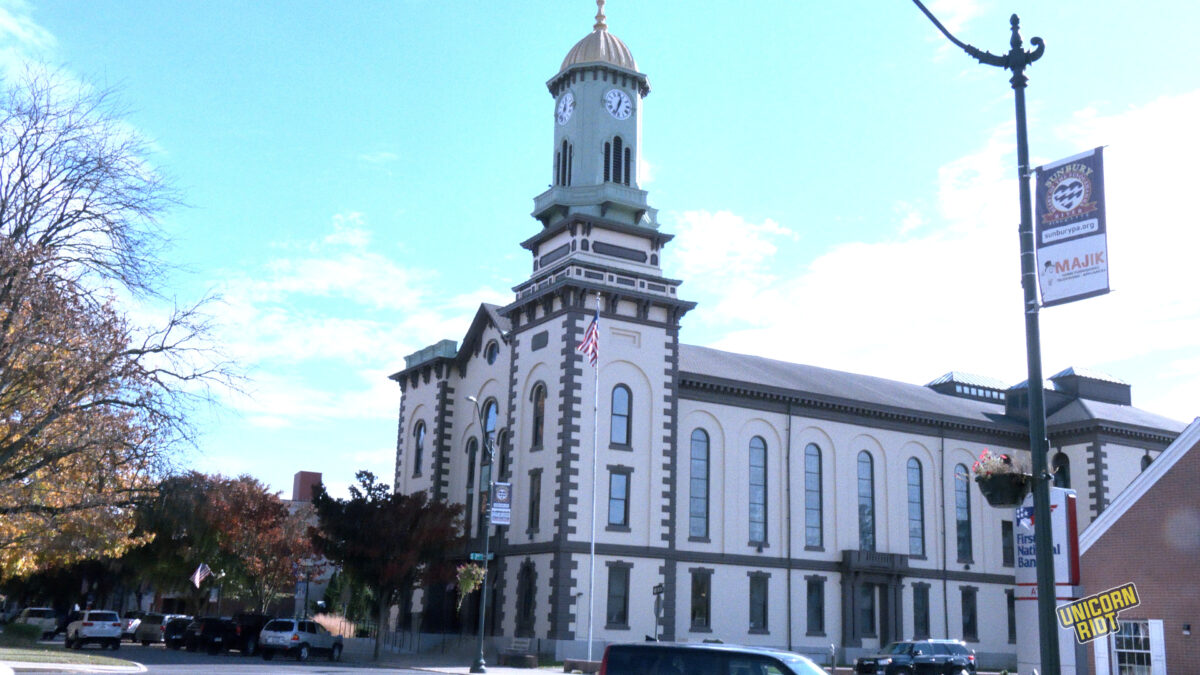
Judge Skeptical of ‘Terrorism’-Level Bail in November 4 Hearing
A sunny and tranquil afternoon in Sunbury, a central Pennsylvania river town, was the setting for the bail hearing on ecoterrorism and other charges for the two defendants on Monday, November 4, while locals raked leaves and senior citizens strolled the park outside the courthouse.
Watch Unicorn Riot’s dispatch after attending the hearing on Monday, November 4:
[EDITOR’S NOTE: This report was recorded before Judge Paige Rosini made a ruling on the defense’s bail modification request.]
The bail hearing was overseen by Judge Paige Rosini, a former defense attorney elected to the Northumberland County Court of Common Pleas in 2015.

Celeste Legere was represented by Jim Best and Cara Mitrano was represented by Gerald Iwanejko, Jr. — both public defenders.
Mike O’Donnell, the prosecuting attorney in the case, was elected as the Northumberland District Attorney earlier in 2023 after running as the Republican nominee on a ‘tough on crime’ platform.

District Attorney O’Donnell opposed the defense’s bail modification request, claiming Legere and Mitrano were an “extreme flight risk.” He referred to a map of the area surrounding the Stahl mink farm allegedly found on the defendants and began to reference the literature about using VPNs, the Tor Browser and burner phones (allegedly found during the defendants’ arrests), but was interrupted by Judge Rosini – “I’ll stop you there, do you have any evidence?” O’Donnell replied by answering “the affidavits,” to which Rosini replied, “affidavits aren’t evidence.”
Celeste Legere told the court that she works as a therapist and volunteers with various community projects such as clothing drives for unhoused people. Cara Mitrano, who told the court she “ran a free pantry out of my home” and helps with a local Earn-A-Bike program, works in medical data analytics. Both defendants testified that they had no prior criminal record and promised to attend any future court dates.
Legere also testified that she was being held in so-called protective custody because she was a trans woman — meaning she had very limited time outside of her cell and had limited access to the commissary; officers had been instructed not to let her have any contact with other inmates. She told the court that “almost every time I am let out of my cell I receive pervasive sexual harassment” as well as “threats of rape” and said she’d been denied any access to her hormone medication since her October 19 arrest.
When the proceedings moved on to the defendants’ home address and housing upon posting bail, District Attorney O’Donnell was extremely eager to zero in on what he alternately described as “anarchist communes” or “compounds” — aka ‘collective houses’ where the defendants live with roommates.
After O’Donnell began this line of questioning, Judge Rosini said he could “ask about specific groups” but that “saying anarchy or anarchist is pretty broad.” O’Donnell also pressed the defendants and witnesses on whether their collective house roommates were involved in “anti-law enforcement activities.”
Defense counsel asked the court to allow their clients to bail out at a lower amount by reminding the court that they were “presumed innocent” and had a “long-term residence” in a “stable location” with phone access and “substantial ties” to a community.
Character witnesses described both Legere and Mitrano with phrases like “reliable and honest,” “kind and thoughtful person.” Others, including several doctors and an attorney, offered to house and employ the defendants upon their release. When questioning one character witness offering to house one of the defendants, O’Donnell pressed them on why they thought bail should be granted. They replied, “because we live in a free country, and I think that’s important.”
Judge Rosini also pushed back on O’Donnell’s claim that the defendants should be denied bail because they weren’t from the area – “living in another state isn’t necessarily a flight risk.”
Amidst his final remarks arguing against the bail modification request, the District Attorney O’ Donnell again started to cite the internet privacy literature allegedly found during Legere and Mitrano’s arrest the defense quickly objected to this, and the Judge sustained the objection.
O’Donnell insisted that the higher bail amount should remain in place because “they came here to commit a crime,” adding, “they did ram Mr. Stahl’s car in order to leave,” and that they employed “well thought-out, sophisticated tactics. He told Judge Rosini that “it doesn’t matter if they’ve injured someone or not,” to which she replied “that’s one of the conditions.” O’Donnell also failed to offer any substantiation for his claim that the defendants were in “an organization” when Judge Rosini asked, “do you have proof of that organization?”
“The commonwealth hasn’t presented an iota of evidence to support the claims made by Mr. O’Donnell.”
James Best, Sunbury attorney representing defendant Celeste Legere
The Monday afternoon ended on a slightly hopeful note for the defendants and their supporters as some of Judge Rosini’s final remarks seemed to cast doubt on the prosecution’s demonization of the two women as violent threats who could strike again at any time if let out of jail:
“This is exponentially more than is set for people who hurt people… How is $150,000 a reasonable bail for someone who hasn’t hurt people?…This is a property crime…. Who are they at risk of hurting?”
Judge Paige Rosini at November 4, 2024 bail hearing for Celeste Legere and Cara Mitrano
The hearing ended with Judge Rosini saying she would read additional letters of support for the defendants that had been submitted and make a decision in the coming days. Later that week, Legere and Mitrano were each allowed to post 10 percent cash of their $150,000 bail – an option not available prior to Judge Rosini’s decision after the bail hearing.
Both were released without GPS monitoring or home confinement conditions, and allowed to leave Pennsylvania on the condition that they check in with Northumberland County probation twice a month. Rosini also nullified a no-contact order between the defendants, another request by the defense made on the grounds that they need to coordinate a mutual defense.
“My client is grateful to the court for recognizing that she is not a danger,” Legere’s attorney James Best told the Daily Item. “She looks forward to returning to her community while she fights these charges.” District Attorney O’Donnell complained that Rosini’s decision “downplays the nature of this crime.” Fur Commission USA, an industry lobby group paying close attention to the case, circulated a statement claiming that “granting reduced bail” “only emboldens extremist activists.”
Stahl & Sons Fur Farm Previously Targeted by Animal Liberation Front
Located in Sunbury, Pennsylvania, just off of State Route 890, the Richard H. Stahl & Sons mink farm was founded in 1955 and currently has 7 employees with an annual revenue of $298,790, according to business directory information. The October 19 incident for which Legere and Mitrano are charged is not the first time the Stahl family’s mink pelt facility been targeted — it was previously raided in 2023 by animal liberationists who freed between 6,000 and 8,000 mink.
While the exact details of Stahl & Sons’ operations are not public, it’s estimated to kill thousands of mink each year. Mink raised for fur generally do not live to see their first birthday and are typically killed one of three ways — being gassed with carbon dioxide, getting beaten to death and/or having their neck snapped, or being electrocuted.
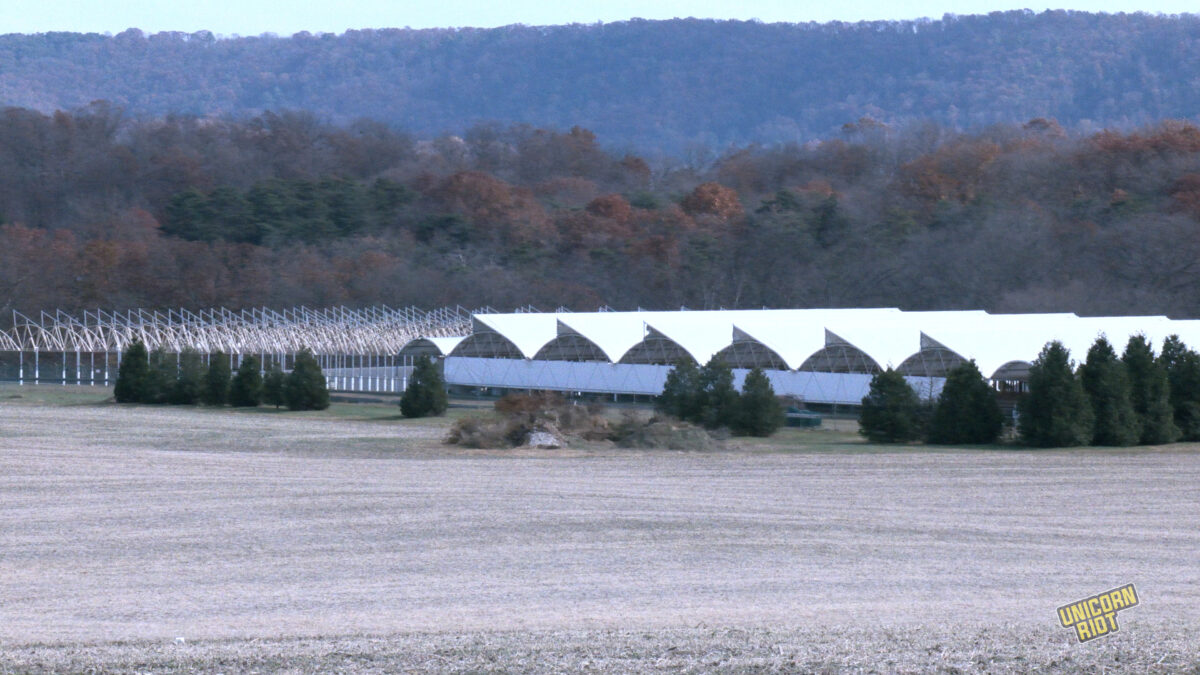
Images of the facility taken on November 4, 2024 show that in addition to the dozen or so large pens containing mink cages, numerous additional new rows of pens are under construction.
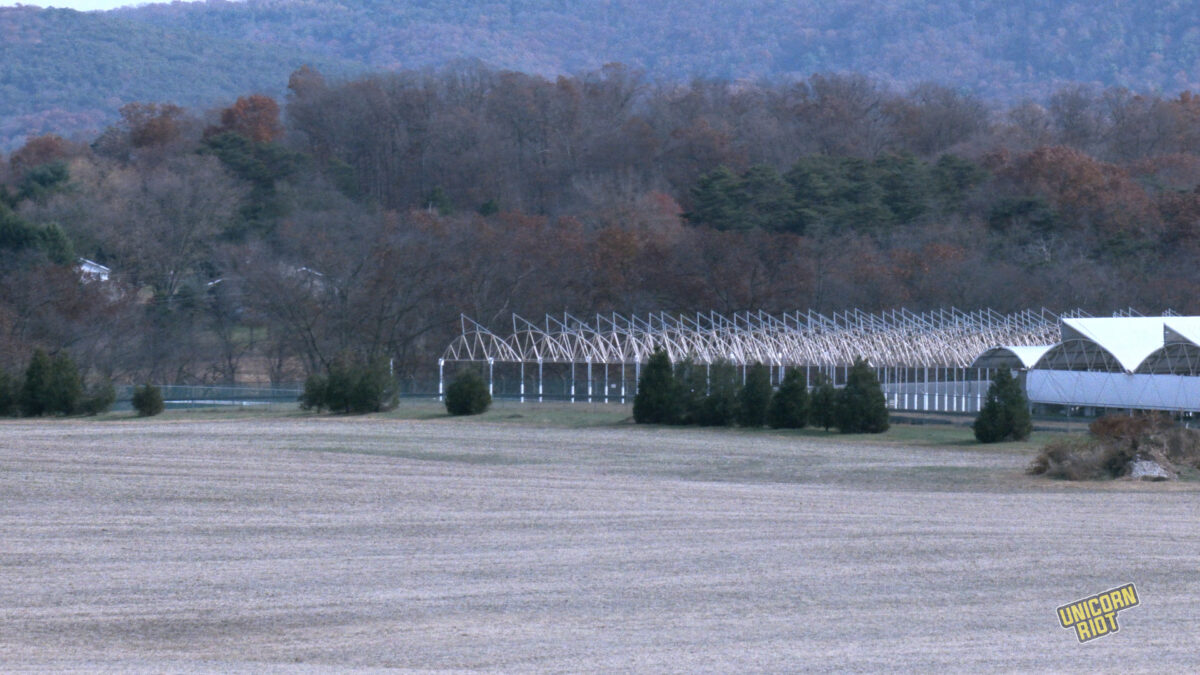
Local media has repeatedly quoted statements branding Legere, Mitrano and the wider animal rights movement as “terrorists” and “domestic extremists” by the Fur Commission USA, a 501(c)6 nonprofit that pushes the mink industry’s interests. Corporate-owned news in Northumberland County and Pennsylvania has thus far failed to note a conflict of interest regarding the entity’s advocacy in this case: Mark Stahl of the Richard H. Stahl Sons Inc. mink farm is the Secretary of Fur Commission USA, according to 2024 IRS records.
Fur Industry In Decline
Mink farming has long been a priority target of the Animal Liberation Front as well as those seeking more humane treatment of animals generally. Banned in 20 countries but not in the USA, fur farms confine mink — semi-solitary aquatic predators who roam miles in a day in the wild — to crowded rows of small, often unhygienic cages not much larger than the size of their body. Mink routinely injure themselves in confinement by fighting with each other or biting and scratching on their cages until they bleed and their teeth and claws break.
Fur farms have also been labeled a “pandemic time bomb” and are ideal superspreader sites for diseases like the coronavirus or bird flu, according to recent research by scientists at Imperial College London.
“Fur farming takes place in a high-density animal environment that allows for rapid spread of viruses with pandemic potential—and for virus adaptation to animals that would be unlikely to occur in nature. This is particularly true for normally solitary, undomesticated carnivores, such as mink… mink, more so than any other farmed species, pose a risk for the emergence of future disease outbreaks and the evolution of future pandemics.”
‘Mink farming poses risks for future viral pandemics’, 2023 study by Thomas P. Peacock and Wendy S. Barclay, Imperial College London
Between 2017 and 2022 over half the fur farms in the US closed and the value of mink pelts declined by 68 percent, according to the Humane Society. Some fur farmers hope that these strong downturns will be offset by increased demand for furs from Russia and China.
Despite the escalating repression of the animal liberation and animal rights movements in the post-9/11 era, supporters of direct action against the fur industry believe that they can push it further towards collapse. While it remains to be seen if the allegations against Celeste Legere and Cara Mitrano will hold up in court, their supporters say they are dedicated to helping them beat the case and stay free.
Cover image composition, photography and additional contributions by Dan Feidt. Mink element in cover via Dzīvnieku brīvība on YouTube.
Follow us on X (aka Twitter), Facebook, YouTube, Vimeo, Instagram, Mastodon, Threads, BlueSky and Patreon.
Please consider a tax-deductible donation to help sustain our horizontally-organized, non-profit media organization:

